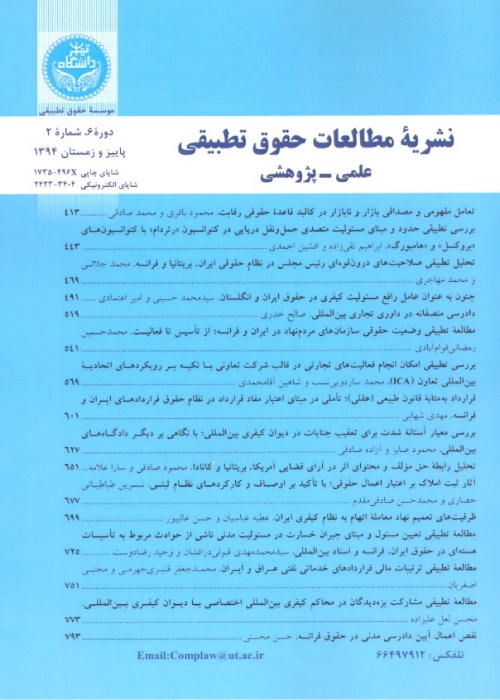The Comparative Study of the Distinction Criterion between Contractual and Non-contractual Liability in Iranian and French Law
Extra-contractual liability in its wide sense, is defined as the compensation of losses in the absent of a contract. Although different discussions have been carried out regarding this concept, there are considerable controversies in respect of definition, examples and unity or plurality of extra-contractual liability and contractual liability. It seems that these controversies are mostly the result of the lack of studying of the distinguishing criterion between these two kinds of liability. A criterion which can put an end to some controversies regarding the examples of these two kinds of liability as well as deciding about the new examples which might not be fully comprehensively studied. Although, different criterions can be extracted from existing studies, some critics show the necessity of proposing a specific and acceptable criterion. Some criterions can be distracted from current studies, but they would not prevent non related examples to enter into the scope of the extra-contractual liability. In other word, these criterions are too wide. On the other hand, the perspective about some notions which are used as the current criterions, are not correct. For instance, “contract” itself is considered as one of the criterions. It means that, whenever there is a contract, the liability which arises is contractual. Otherwise, it is considered non- contractual. In this criterion, contract is considered as a material instrument. In other word, the objective aspect of contract is important in this sense, which seems critical from our point of view. Therefore, in this thesis, “volition or will" is proposed as the element which can distinguish contractual and non- contractual liability. Despite the usual objective perspective towards volition and the contract sprang from it, this thesis focuses on the subjective aspect of the said notion. The result of considering volition as the criterion for determining the scope of the extra-contractual and contractual liability is that there might be some situations in which, despite the absence of contract, parties' volition exists. As the result, the liability of parties is considered contractual, although there is no contract between them. For example, the breach of some obligations such as confidentiality which may last even after the termination of a contract is contractual. This is because; the parties’ volition can be attributed to this obligation, although the objective contract between them is terminated. Moreover, sometimes in spite of the existence of the contract, parties' volition doesn't entail the required specifications and as a consequence, can't serve as the basis for the contractual liability. This result is true especially for implicit terms and conditions. These terms can join the contract and might serve as the basis of a contractual liability only if parties’ will is allocated to them therefore, in case of parties’ ignorance about a customary obligation (as an implicit obligation), its breach cannot cause contractual liability. From this perspective, this criterion shall include two specifications. Originality, as the first specification means that parties' will shall be genuine. Parties have to choose an obligation and its liability by their own genuine will. Therefore, imperative rules which are compulsory are not original and can’t serve as a trigger for contractual liability. They are legal obligations and their breach are resulted in non- contractual liability. On the other hand, volition refers to the obligations and commitments which are in line with the main purpose of the contract. This criterion which is also partible with respect to the implied terms and conditions, determines the scope of the said terms which are considered contractual. For instance, duty of care only enters into the contracts which their final purpose is care or something related to that, such as doctors or nurses or those whose duty is considered so critical to hem such as transport enterprises. According to the said criterion, the examples of different kinds of liability are divided into two groups; first, the examples which are not subject of lots of controversies and second, examples which are accompanied with a lot of dissidences. Moreover, providing a criterion which determines the scope of the extra-contractual liability leads to some consequences. Occurrence and proof of the said liability and the compensation of related loss are affected from this criterion and causes some differences between contractual and extra contractual liability.
- حق عضویت دریافتی صرف حمایت از نشریات عضو و نگهداری، تکمیل و توسعه مگیران میشود.
- پرداخت حق اشتراک و دانلود مقالات اجازه بازنشر آن در سایر رسانههای چاپی و دیجیتال را به کاربر نمیدهد.



